Antibody (Suitable for clinical applications)
| Specification | Recommendation |
|---|---|
| Recommended Dilution (Conc) | 1:50-1:100 |
| Pretreatment | EDTA Buffer pH 8.0 |
| Incubation Parameters | 30 min at Room Temperature |
Prior to use, inspect vial for the presence of any precipitate or other unusual physical properties. These can indicate that the antibody has degraded and is no longer suitable for patient samples. Please run positive and negative controls simultaneously with all patient samples to account and control for errors in laboratory procedure. Use of methods or materials not recommended by enQuire Bio including change to dilution range and detection system should be routinely validated by the user.
TNF-alpha Information for Pathologists
Summary:
Also called cachectin. Initiates similar responses as lymphotoxin alpha. Secreted by macrophages and lipopolysaccharides or macrophage activating agents. Binds to 55kDa receptor on many cells throughout body. Has many biologic activities; initiate signals for cell proliferation and apoptosis; required for normal development and function of immune system; suppresses expression of lipoprotein lipase and anabolic enzymes in fat. In large boluses, modifies coagulation properties of endothelial cells, activates neutrophils, induces release of inflammatory cytokines (IL-1), causing cardiovascular collapse. In small amounts, causes symptoms of inflammatory response of bone resorption, fever, anemia, wasting. Both triggers apoptosis and activates NFKB which blocks apoptosis. TNF and IL-1 react with hypothalamic receptors, leading to stimulation of prostaglandin and leukotriene mediated pathways that reset brains thermoregulatory center.
| TNF-alpha General Information | |
|---|---|
| Alternate Names | |
| Molecular Weight | |
| 25.6 kDa | |
| Chromosomal Location | |
| p21.33 [chr: 6] [chr_start: 31575565] [chr_end: 31578336] [strand: 1]; [chr: CHR_HSCHR6_MHC_SSTO_CTG1] [chr_start: 31566312] [chr_end: 31569081] [strand: 1]; [chr: CHR_HSCHR6_MHC_MCF_CTG1] [chr_start: 31651872] [chr_end: 31654641] [strand: 1]; [chr: CHR_HSCHR6_MHC_DBB_CTG1] [chr_start: 31557707] [chr_end: 31560476] [strand: 1]; [chr: CHR_HSCHR6_MHC_QBL_CTG1] [chr_start: 31565793] [chr_end: 31568564] [strand: 1]; [chr: CHR_HSCHR6_MHC_APD_CTG1] [chr_start: 31643520] [chr_end: 31645322] [strand: 1]; [chr: CHR_HSCHR6_MHC_MANN_CTG1] [chr_start: 31615015] [chr_end: 31617784] [strand: 1]; [chr: CHR_HSCHR6_MHC_COX_CTG1] [chr_start: 31562973] [chr_end: 31565742] [strand: 1] | |
| Curated Database and Bioinformatic Data | |
| Gene Symbol | TNF |
| Entrez Gene ID | 7124 |
| RefSeq Protein Accession(s) | NP_000585 |
| RefSeq mRNA Accession(s) | ; NM_000594 |
| RefSeq Genomic Accession(s) | NT_167244; NT_167248; NT_167246; NT_167247; NG_007462; NT_113891; NT_167245; NT_167249; NC_000006 |
| UniProt ID(s) | P01375 |
| PharmGKB ID(s) | PA435 |
| KEGG Gene ID(s) | hsa:7124 |
| Associated Diseases (KEGG IDs) | Psoriatic arthritis (PSORAS) [MIM:607507]: An inflammatory, seronegative arthritis associated with psoriasis. It is a heterogeneous disorder ranging from a mild, non-destructive disease to a severe, progressive, erosive arthropathy. Five types of psoriatic arthritis have been defined: asymmetrical oligoarthritis characterized by primary involvement of the small joints of the fingers or toes; asymmetrical arthritis which involves the joints of the extremities; symmetrical polyarthritis characterized by a rheumatoid like pattern that can involve hands, wrists, ankles, and feet; arthritis mutilans, which is a rare but deforming and destructive condition; arthritis of the sacroiliac joints and spine (psoriatic spondylitis). {ECO:0000269|PubMed:12746914}. Disease susceptibility is associated with variations affecting the gene represented in this entry. |
| General Description of TNF-alpha . | |
| This MAb recognizes human 17-26kDa protein, which is identified as cytokine TNF-alpha (Tumor Necrosis Factor-alpha). Monomeric human TNF-alpha is a 157 amino acid protein (non-glycosylated) with a reported molecular weight of 17 kDa and can be expressed as a free molecule, also TNF-alpha is generated as a precursor form called transmembrane TNF-alpha can be expressed as a cell surface type II polypeptide consisting of 233 amino acid residues molecular weight 26 kDa. TNF-alpha is an important cell-signaling component of the immune system. It is a protein secreted by LPS stimulated macrophages, and causes tumor necrosis when injected into tumor bearing mice. TNF-alpha is currently being evaluated in treatment of certain cancers and AIDS Related Complex. | |

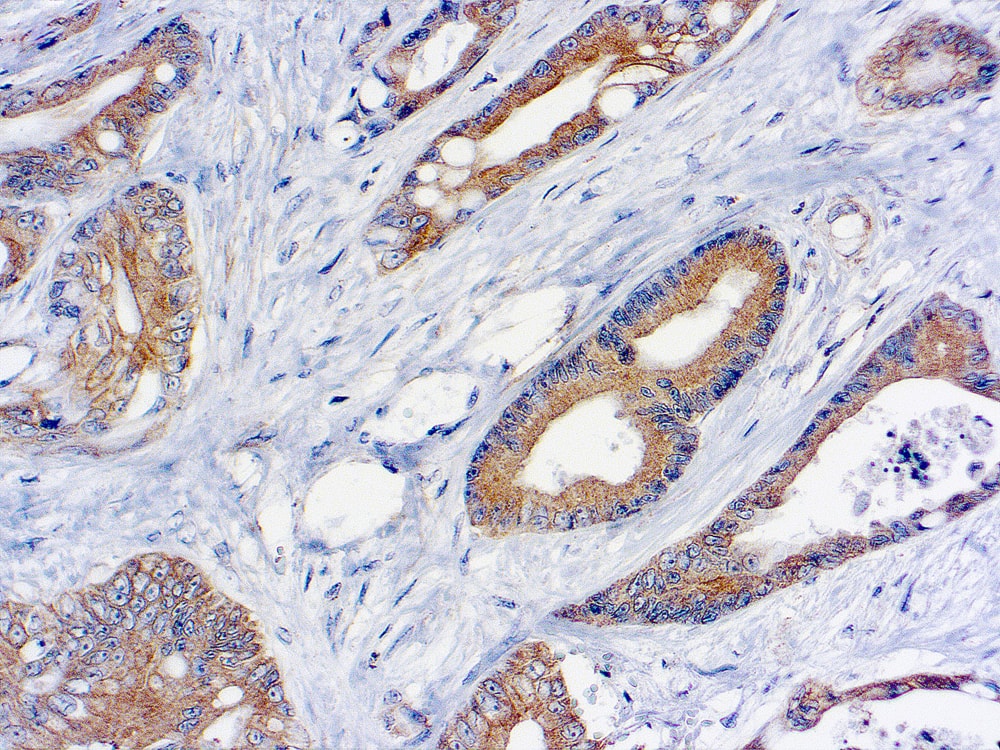

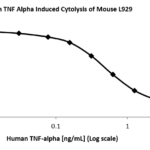
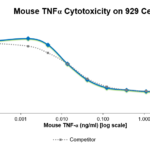
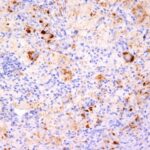
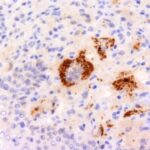
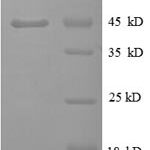
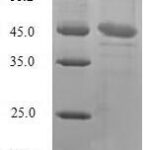
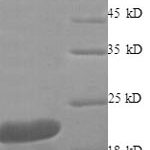
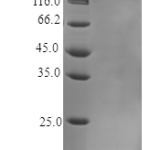
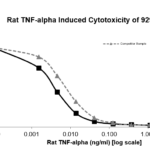
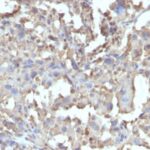
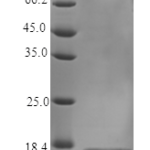
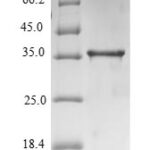

There are no reviews yet.